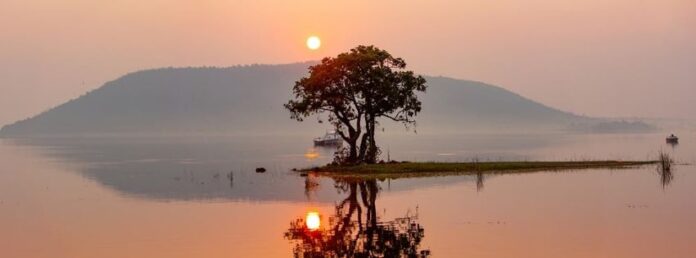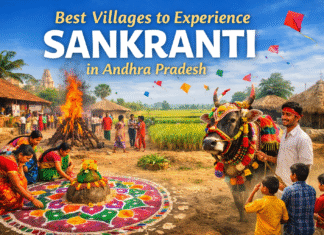In the heart of Telangana, India, nestled amidst lush greenery and rolling hills, lies a haven of tranquility – Pakhal Lake. This man-made marvel, boasting a rich history and captivating natural beauty, beckons nature enthusiasts and history buffs alike. This article delves into the captivating story of Pakhal Lake, exploring its origins, ecological significance, and its allure as a tourist destination.
Also read: most powerful god Padmakshi Temple: A Historical and Spiritual Tapestry
A Legacy Etched in Time: The Creation of Pakhal Lake
Pakhal Lake’s story begins in the 13th century, during the reign of the Kakatiya dynasty. Furthermore, it was a period marked by architectural brilliance and significant cultural developments. First, the lake was constructed to serve as an irrigation source.
Moreover, it became a crucial water resource for the region. In addition, Pakhal Lake provided a serene environment, contributing to the area’s natural beauty. Lastly, the legacy of the Kakatiya dynasty is reflected in this enduring marvel, showcasing their vision and engineering prowess. Renowned for their architectural prowess and emphasis on water management, King Ganapatideva commissioned the construction of the lake in 1213 AD.
The vision was to create a vital irrigation source for the surrounding agricultural lands. This foresight ensured the prosperity of the region for centuries to come.
An Ecological Haven: The Enchanting Embrace of Nature
Pakhal Lake spread majestically over 30 square kilometers, is more than just a reservoir. It serves as a vital ecological sanctuary. Designated as the Pakhal Wildlife Sanctuary, the surrounding area provides a habitat for diverse flora and fauna. The verdant forests surrounding the lake teem with life, offering a glimpse into the rich biodiversity of the region.
Also read: Explore the Secrets of Medak Fort: A Historical Adventure
A Tapestry of Wildlife:
Leopards, with their majestic spotted coats, roam the forested areas surrounding the lake. Spotted deer, graceful and gentle, graze in the clearings. Sloth bears, known for their shaggy fur and laid-back demeanor, can be spotted lumbering through the undergrowth. The skies above the lake come alive with a symphony of bird calls. From the vibrant Kingfisher to the majestic Grey Hornbill, a diverse range of avian species call Pakhal Lake their home.
A Paradise for Nature Lovers:
Pakhal Lake offers a plethora of activities for visitors seeking to reconnect with nature. Experience the serene beauty of gliding across tranquil waters on a boat, an activity available from the early light of sunrise to the soft hues of sunset. To make the most of this peaceful journey, it is advisable to check with local operators beforehand to confirm the exact timings and availability. This ensures that you can plan your day to fully immerse yourself in the calm and picturesque surroundings, creating a memorable and relaxing experience. Soaking in the breathtaking scenery is a guaranteed reward.
For the more adventurous, birdwatching expeditions can be a rewarding experience, with the possibility of spotting a myriad of colorful birds flitting through the trees or soaring across the vast expanse of the sky. Nature walks along designated trails allow visitors to immerse themselves in the serenity of the surroundings and appreciate the diverse flora and fauna.

Also read: Do You Know History of Ujjaini Mahakali Temple in Hyderabad?
Beyond the Boat Ride: Exploring the Surroundings
For those seeking a more active adventure, the Pakhal Wildlife Sanctuary offers jeep safaris. These guided tours, led by experienced professionals, provide a unique opportunity to observe wildlife in their natural habitat. It’s important to note that jeep safaris may require prior booking and additional fees.
A Glimpse into Local Culture:
Several charming villages dot the landscape around Pakhal Lake. Immersing yourself in the local culture by interacting with villagers and trying their traditional cuisine can be a truly enriching experience.
Accommodation Options:
For those seeking a longer stay and a deeper connection with nature, eco-resorts are available near the lake. These resorts offer comfortable accommodations nestled amidst the picturesque landscape, allowing visitors to truly experience the tranquility of Pakhal Lake. Some resorts might even offer additional activities like fishing (regulations apply) or guided nature walks.
Location and Accessibility:
Pakhal Lake is situated approximately 50 kilometers east of Warangal city. Reaching the lake is a breeze, with well-maintained roads connecting it to the city. There’s no official entry fee for visiting the lake, making it an accessible destination for all.
A Perfect Blend of Tranquility and Adventure:
Pakhal Lake offers a unique escape from the hustle and bustle of city life. It’s a place to unwind amidst the serenity of nature, observe diverse wildlife, and delve into the rich history of the region. Whether you’re seeking a peaceful boat ride, an exciting birdwatching expedition, or a more adventurous safari experience, Pakhal Lake has something to offer everyone.
Seasonal Spectacle:
The beauty of Pakhal Lake transforms throughout the year. During the monsoon season, which typically spans from July to September, the surrounding hills transform into a vibrant expanse of lush greenery, creating a truly breathtaking vista.
The rainfall rejuvenates the landscape, painting the hills in various shades of green and bringing a fresh, invigorating atmosphere. However, it’s important to note that the increased rainfall during this period can cause water levels in rivers and lakes to rise significantly.
This surge in water levels, while adding to the natural beauty, might also affect certain recreational activities, such as boating. Higher water levels can make boating conditions more challenging and sometimes unsafe, leading to temporary restrictions or alterations in boating schedules.
Despite these potential limitations, the monsoon season remains a magical time to witness the natural and splendor of the hills, as long as visitors are mindful of the weather conditions and any advisories regarding water-based activities. The winter months (November to February) offer a more pleasant climate for outdoor activities like birdwatching and nature walks.
Also read:
The Charm of Osman Sagar Lake: Beautiful Hyderabad’s Oasis lake
Fishing:
While not explicitly mentioned earlier, fishing is a possibility at Pakhal Lake. However, it’s crucial to be aware of local regulations and obtain any necessary permits before casting a line. It’s best to inquire with local authorities or resorts about specific regulations and responsible fishing practices.
Festivals and Local Traditions:
The region around Pakhal Lake celebrates various festivals throughout the year. Some festivals, like Sankranti (harvest festival), might involve vibrant celebrations in nearby villages. Participating in these celebrations, if permitted and with due respect for local customs, can offer a unique cultural experience.
Responsible Tourism:
Remember, Pakhal Lake is a vital ecological sanctuary. Practice responsible tourism: minimize waste, respect wildlife, and stick to designated trails.
Further Exploration:
For a more comprehensive experience, consider combining a visit to Pakhal Lake with nearby attractions. The Warangal Fort, a testament to the Kakatiya dynasty’s architectural prowess, or the Kakatiya Zoological Park, offering a glimpse into the region’s diverse fauna, are both within driving distance.
By incorporating these details, you’ve created a well-rounded guide to Pakhal Lake, enticing visitors to experience its natural beauty, cultural richness, and historical significance.
FAQS
ANS) Pakhal Lake is situated in Warangal district, Telangana, India.
ANS) It’s an artificial lake built by King Ganapati Deva of the Kakatiya dynasty in the 12th century.
ANS) The best time to visit is between October and March when the weather is pleasant.
ANS) You can enjoy boating, fishing, birdwatching, trekking, and picnicking.
ANS) Yes, Pakhal Lake is surrounded by a wildlife sanctuary, home to various animals and birds.











